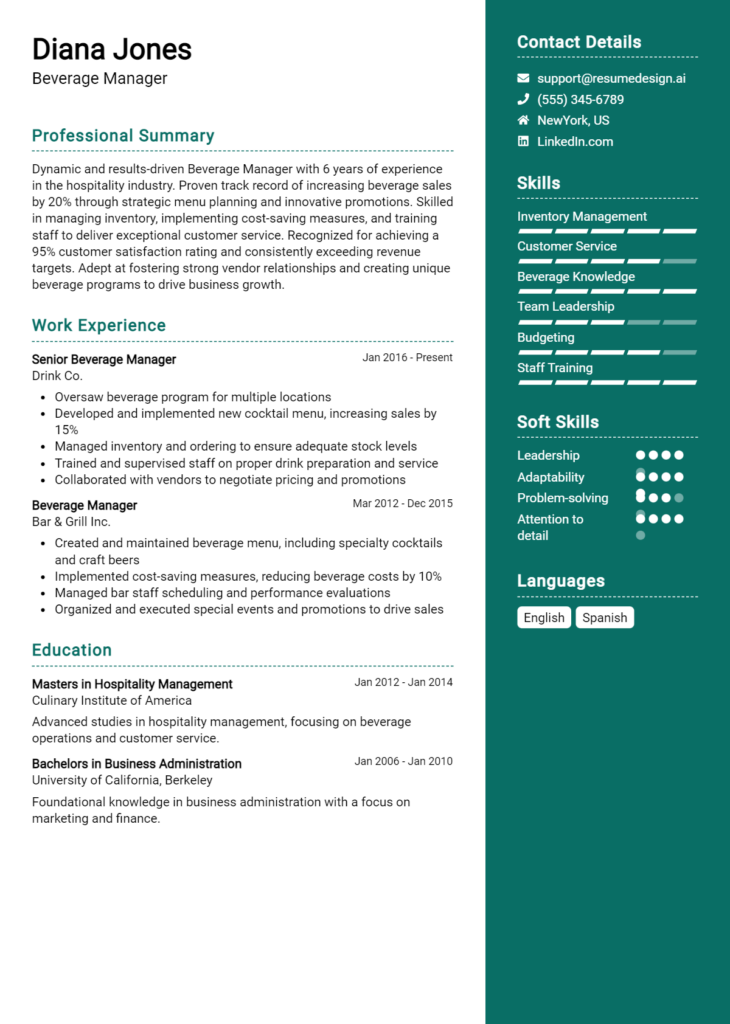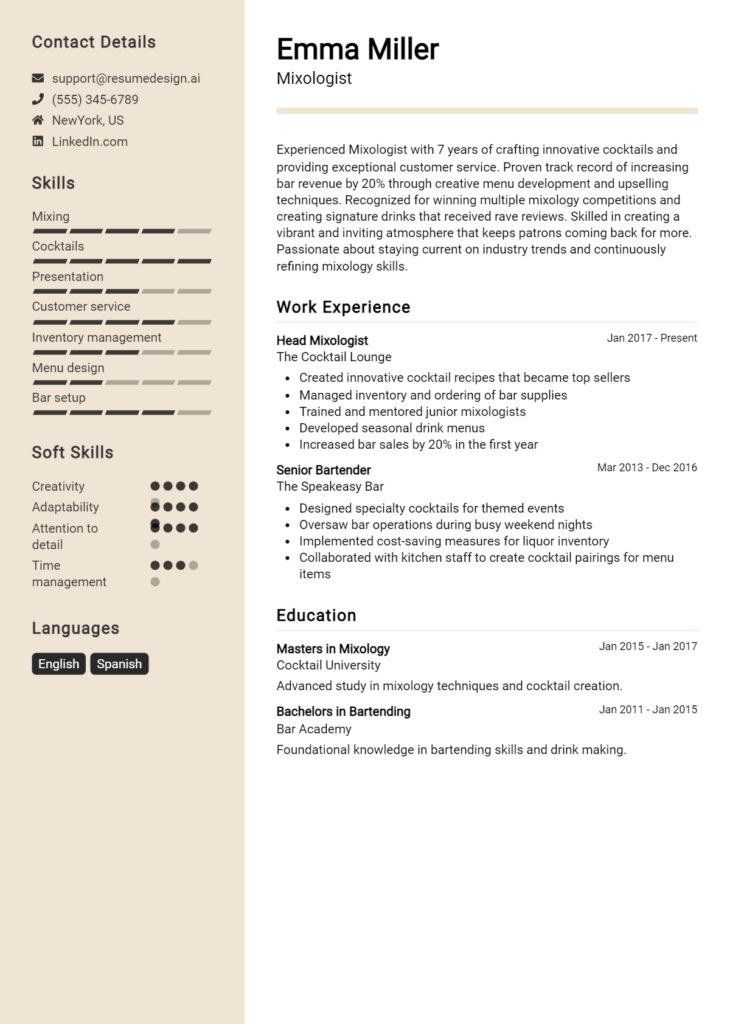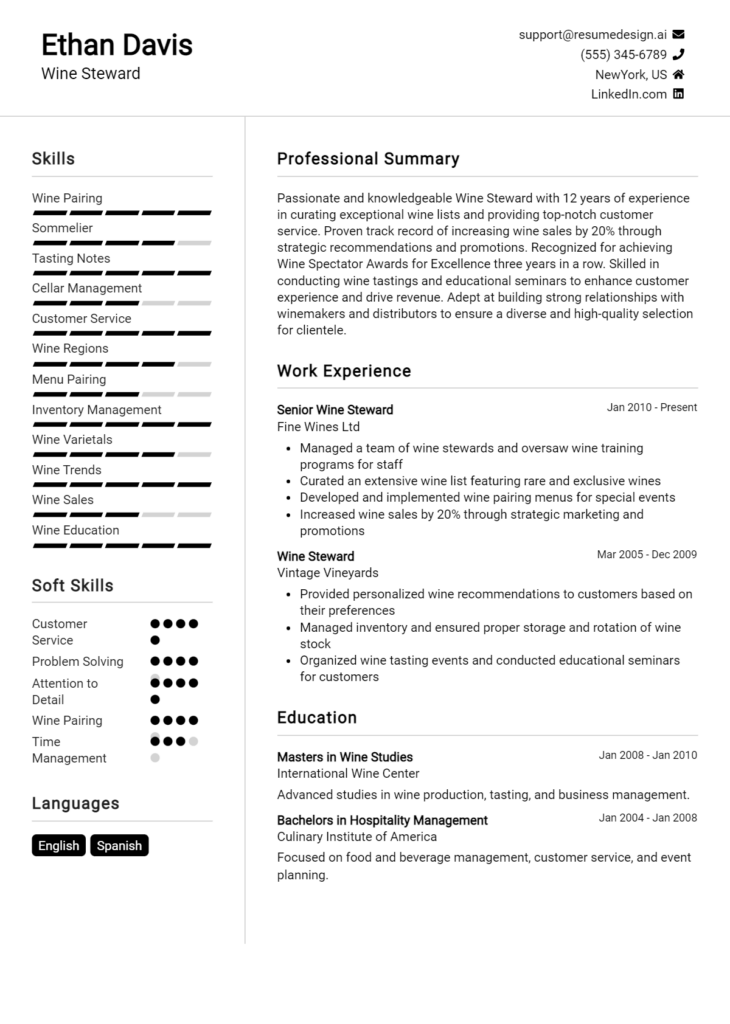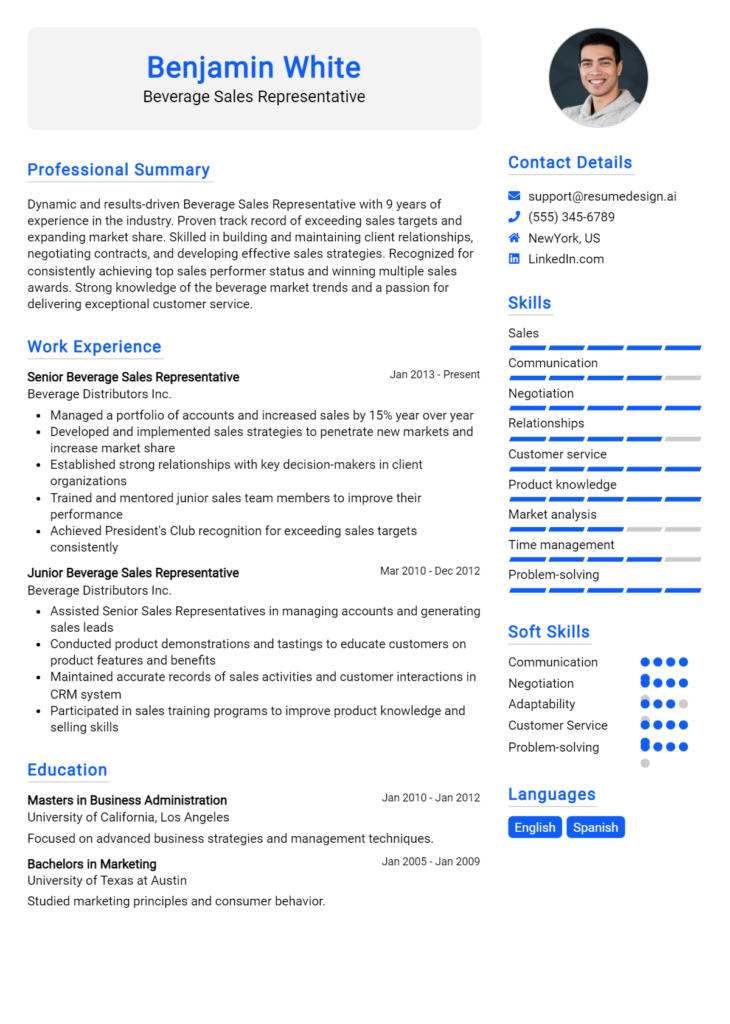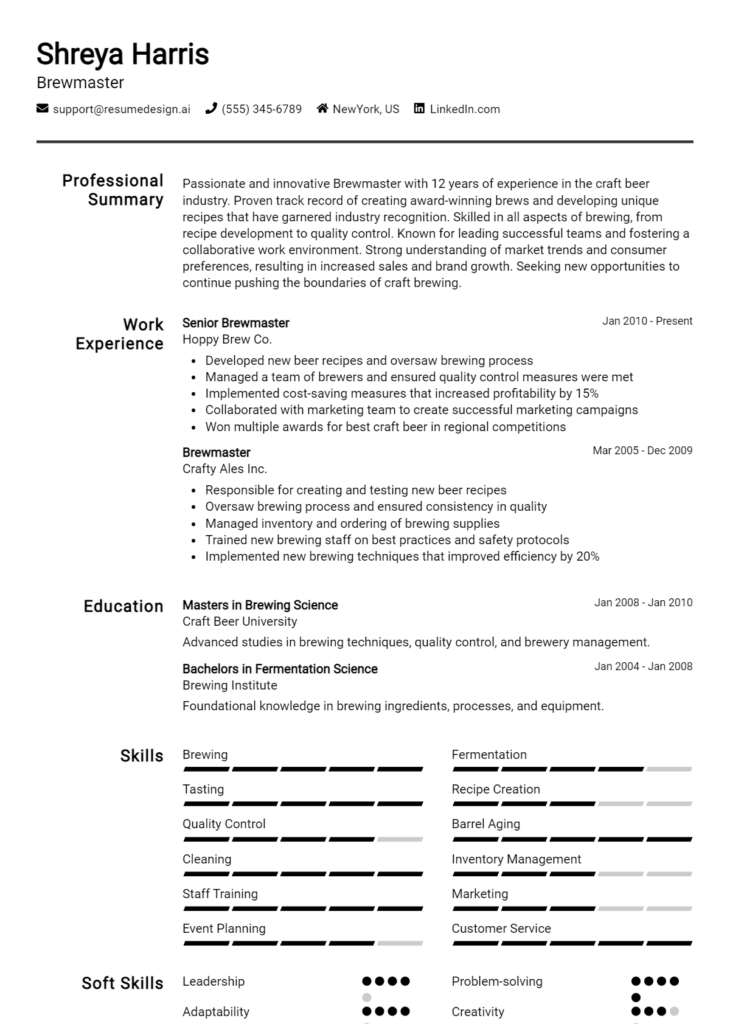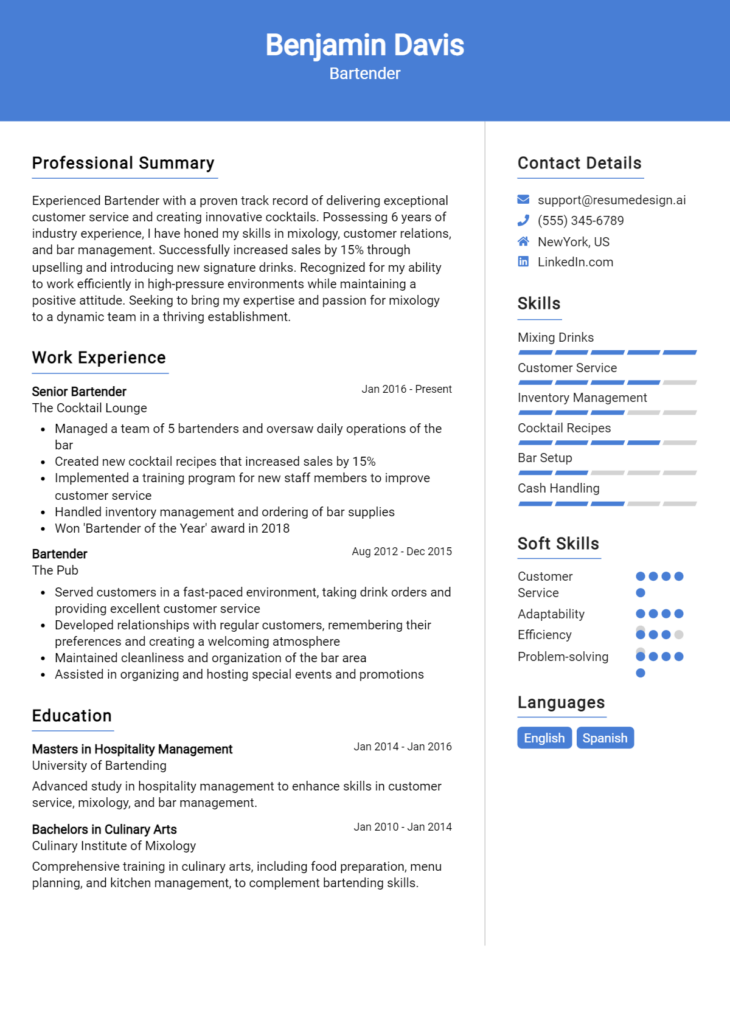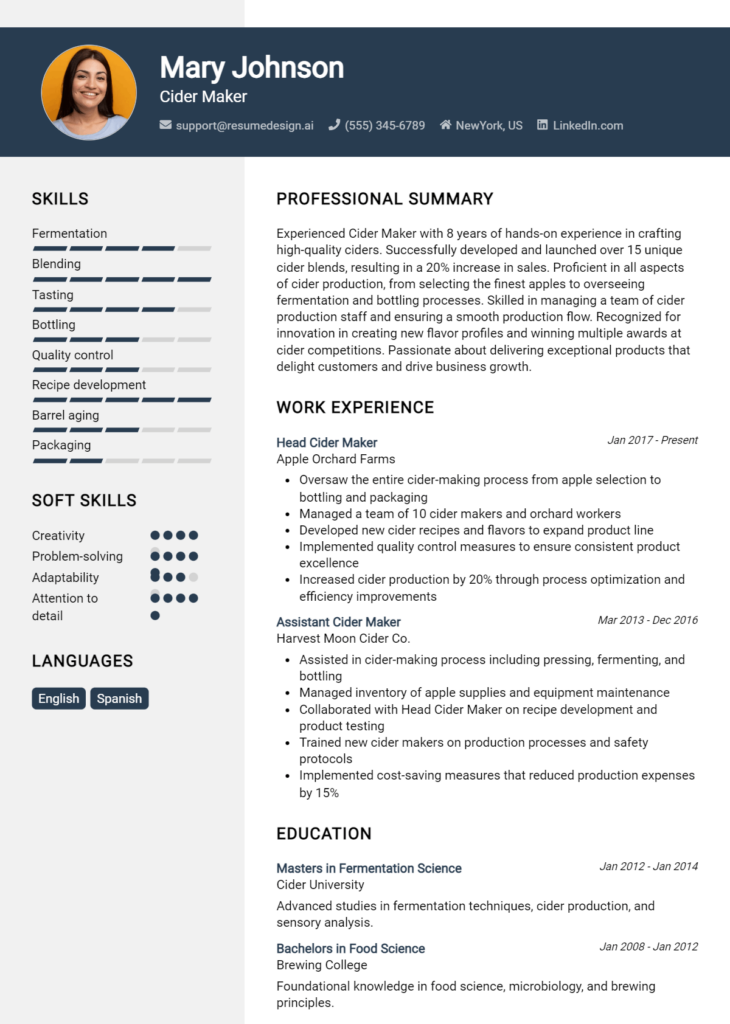Distillery Manager Core Responsibilities
A Distillery Manager plays a pivotal role in overseeing the production of spirits, bridging departments such as production, quality control, and logistics. Key responsibilities include managing fermentation and distillation processes, ensuring compliance with safety regulations, and optimizing production efficiency. Essential skills encompass technical knowledge of distilling equipment, operational management, and strong problem-solving abilities. These competencies not only contribute to the organization’s goals but are also crucial for maintaining product quality. A well-structured resume can effectively highlight these qualifications, showcasing the candidate's ability to lead and innovate within the industry.
Common Responsibilities Listed on Distillery Manager Resume
- Oversee daily operations of the distillery, ensuring efficient production processes.
- Manage staff, including training and development of team members.
- Monitor quality control measures to maintain product standards.
- Develop and implement production schedules and budgets.
- Ensure compliance with health and safety regulations.
- Collaborate with marketing and sales teams to align production with demand.
- Conduct regular maintenance and troubleshooting of distilling equipment.
- Analyze production data to identify areas for improvement.
- Manage inventory of raw materials and finished products.
- Maintain relationships with suppliers and regulatory agencies.
- Develop new products and enhance existing recipes.
- Prepare reports and presentations for upper management.
High-Level Resume Tips for Distillery Manager Professionals
In the competitive landscape of the distillery industry, a well-crafted resume is crucial for Distillery Manager professionals. This document often serves as the first impression a candidate makes on a potential employer, making it vital that it effectively showcases both skills and achievements. A strong resume not only highlights your relevant experience but also emphasizes your unique contributions to previous roles, setting you apart from other applicants. In this guide, we will provide practical and actionable resume tips specifically tailored for Distillery Manager professionals to help you create a standout application.
Top Resume Tips for Distillery Manager Professionals
- Tailor your resume to the specific job description by incorporating keywords and phrases used in the posting.
- Highlight relevant experience in distillery management, including specific roles and responsibilities that align with the position.
- Quantify your achievements with metrics, such as production volume increases, cost reductions, or improvements in quality control.
- Showcase industry-specific skills, such as knowledge of fermentation processes, distillation techniques, and regulatory compliance.
- Include any certifications or training relevant to the distillery field, such as those in brewing, distillation, or quality assurance.
- Demonstrate leadership abilities by providing examples of team management, staff training, or project oversight.
- Utilize a clean and professional layout that enhances readability and highlights key sections effectively.
- Incorporate a summary statement that succinctly captures your career goals and what you bring to the role of Distillery Manager.
- Consider including a section for relevant professional affiliations or memberships in industry organizations.
- Proofread your resume multiple times to eliminate errors and ensure it reflects your professionalism.
By implementing these tips, you can significantly enhance your chances of landing a job in the Distillery Manager field. A polished and targeted resume will not only attract the attention of hiring managers but also convey your expertise and passion for the industry, making you a compelling candidate for any distillery operation.
Why Resume Headlines & Titles are Important for Distillery Manager
In the highly competitive field of distillation, a Distillery Manager's resume must stand out to capture the attention of hiring managers. A well-crafted resume headline or title serves as a powerful introduction, summarizing a candidate's key qualifications in a succinct and impactful manner. It not only highlights the essential skills and experiences relevant to the role but also sets the tone for the entire resume. A strong headline immediately draws the reader's interest and provides a clear indication of the value the candidate brings to the distillery, making it a crucial component of any effective application.
Best Practices for Crafting Resume Headlines for Distillery Manager
- Keep it concise: Aim for one impactful phrase that encapsulates your strengths.
- Be role-specific: Tailor the headline to reflect the responsibilities and skills of a Distillery Manager.
- Highlight key accomplishments: Include any notable achievements that will resonate with potential employers.
- Use strong action words: Incorporate dynamic verbs that convey leadership and expertise.
- Focus on unique skills: Identify what sets you apart from other candidates in the distillation industry.
- Align with job description: Mirror the language and requirements found in the job posting for relevance.
- Maintain professionalism: Ensure the tone of the headline reflects the seriousness of the position.
- Proofread: Make sure there are no typos or grammatical errors, as these can undermine credibility.
Example Resume Headlines for Distillery Manager
Strong Resume Headlines
"Innovative Distillery Manager with 10+ Years of Experience in Crafting Award-Winning Spirits"
"Results-Driven Distillery Manager Specializing in Sustainable Production Practices"
“Dynamic Leader in Distillation Operations with Proven Track Record in Efficiency Improvements”
“Expert Distillery Manager Focused on Quality Control and Team Development”
Weak Resume Headlines
"Distillery Manager Seeking Employment"
"Experienced Worker in Alcohol Production"
The strong headlines are effective because they clearly articulate the candidate’s expertise, experience, and unique contributions to the distillery sector. They provide specific details that can engage hiring managers, making the candidate memorable. In contrast, the weak headlines lack clarity and specificity, failing to convey the candidate's strengths or differentiate them from others. This generic approach can result in missed opportunities, as hiring managers may overlook candidates who do not present a compelling first impression.
Writing an Exceptional Distillery Manager Resume Summary
A well-crafted resume summary is a crucial element for a Distillery Manager, as it serves as the first impression a hiring manager has of a candidate. This introductory paragraph quickly captures attention by succinctly showcasing key skills, relevant experience, and significant accomplishments that align with the demands of the role. A strong summary should be concise and impactful, tailored to the specific job description to demonstrate a clear understanding of the position and how the candidate can contribute to the success of the distillery.
Best Practices for Writing a Distillery Manager Resume Summary
- Quantify achievements: Use numbers and percentages to highlight your accomplishments, such as production increases or cost savings.
- Focus on skills: Emphasize skills that are pertinent to the distillery industry, such as fermentation, quality control, and regulatory compliance.
- Tailor the summary: Customize your summary for each job application, reflecting specific requirements and keywords from the job description.
- Be concise: Aim for 3-5 sentences that encapsulate your core strengths and experiences without overwhelming the reader.
- Highlight leadership: Demonstrate your ability to lead teams, manage operations, and drive improvements in production processes.
- Showcase industry knowledge: Include relevant certifications, technologies, or methodologies that are recognized in the distilling industry.
- Express passion: Convey enthusiasm for the distilling craft and industry trends to resonate with the hiring manager.
Example Distillery Manager Resume Summaries
Strong Resume Summaries
Detail-oriented Distillery Manager with over 10 years of experience in crafting premium spirits. Achieved a 30% increase in production efficiency and reduced overhead costs by 15% through innovative process improvements and team training.
Accomplished Distillery Manager with a proven track record in managing operations for a top-rated distillery. Successfully launched three new product lines that contributed to a 25% revenue growth within two years, while maintaining compliance with all industry regulations.
Results-driven Distillery Manager skilled in fermentation science and quality assurance. Spearheaded a quality improvement initiative that resulted in a 40% decrease in production defects, leading to higher customer satisfaction and retention rates.
Weak Resume Summaries
Experienced manager looking for a new opportunity in distilling. I have worked in various roles and can handle different tasks.
Dedicated professional with some experience in the beverage industry. I’m interested in managing a distillery and improving operations.
The strong resume summaries are effective because they provide specific, quantifiable achievements and relevant skills tailored to the distillery manager role, demonstrating a clear impact on previous employers. In contrast, the weak summaries are vague and generic, lacking measurable outcomes and failing to convey any significant qualifications, which diminishes their effectiveness in capturing a hiring manager's attention.
Work Experience Section for Distillery Manager Resume
The work experience section of a Distillery Manager resume is crucial in demonstrating the candidate's technical skills, team management capabilities, and ability to deliver high-quality products. This section not only reflects the applicant's hands-on experience in distillation processes, quality control, and regulatory compliance, but also showcases their leadership in managing teams and fostering collaboration. By quantifying achievements—such as increased production efficiency or reduced waste—and aligning experiences with industry standards, candidates can effectively illustrate their value to potential employers in the competitive spirits industry.
Best Practices for Distillery Manager Work Experience
- Highlight specific technical skills relevant to distillation and production processes.
- Quantify achievements with metrics such as production volume increases or cost reductions.
- Emphasize leadership roles and team management experiences.
- Showcase collaboration with cross-functional teams, including marketing and quality assurance.
- Tailor your experiences to match the job description and industry requirements.
- Include any relevant certifications or training that enhance your professional credibility.
- Use action verbs to convey a sense of dynamism and initiative.
- Document any innovative solutions implemented that improved efficiency or quality.
Example Work Experiences for Distillery Manager
Strong Experiences
- Led a team of 15 in a 30% increase in production efficiency over two years, resulting in a cost savings of $250,000 annually.
- Implemented a new quality control system that reduced product defects by 40%, enhancing customer satisfaction and brand reputation.
- Collaborated with the R&D team to develop two new spirits, contributing to a 25% increase in market share within one year.
- Managed the transition to sustainable production practices, achieving a 50% reduction in water usage and earning industry recognition.
Weak Experiences
- Responsible for overseeing production processes without specific outcomes mentioned.
- Worked with a team on various projects but did not specify contributions or results.
- Participated in quality checks, but lacked details on the impact of these checks.
- Involved in inventory management with no quantifiable metrics or improvements noted.
The examples classified as strong are characterized by their specificity, quantifiable results, and clear demonstration of leadership and collaboration. They provide tangible evidence of the candidate's impact in previous roles, making them compelling to hiring managers. In contrast, the weak examples lack detail and measurable outcomes, which diminishes their effectiveness in showcasing the candidate's qualifications for the Distillery Manager position.
Certifications and Education for a Distillery Manager Resume
When crafting a resume for a Distillery Manager position, it's essential to highlight your educational background and relevant certifications that demonstrate your expertise in the field. Here’s how to effectively list these qualifications:
Certifications to Prioritize:
Certified Distillery Manager (CDM) - This certification is often offered by industry organizations and provides a comprehensive understanding of distillation processes, regulatory compliance, and operational management.
Brewing and Distillation Diploma - Offered by various institutions, this diploma delves into the science and art of distillation, covering everything from raw material selection to the production process.
Certified Executive Distiller (CED) - This advanced certification focuses on the strategic and operational skills required to manage a distillery successfully, including finance, marketing, and production management.
Hazard Analysis and Critical Control Points (HACCP) - Certification in HACCP is vital for ensuring food safety and quality, which is crucial in the beverage production industry.
Educational Background Examples:
Bachelor’s Degree in Food Science or Fermentation Science - A degree in food science provides a solid foundation in the principles of fermentation, chemistry, and microbiology, which are essential in distilling.
Bachelor’s Degree in Business Administration - This degree can be beneficial for understanding the business aspects of running a distillery, including finance, marketing, and operations management.
Associate Degree in Brewing and Distillation Technology - An associate degree focused specifically on brewing and distillation technology offers hands-on experience and foundational knowledge in the industry.
Master’s Degree in Enology and Viticulture - While primarily focused on wine production, a master’s degree in this area can also be applicable to distilling spirits, especially when dealing with fruit-based distillates.
When listing these qualifications on your resume, be sure to include the name of the institution, the degree or certification obtained, and the date of completion. This structured approach will help showcase your qualifications effectively and enhance your candidacy for the Distillery Manager role.
Top Skills & Keywords for Distillery Manager Resume
A Distillery Manager plays a pivotal role in overseeing the entire production process of spirits, ensuring quality and efficiency while adhering to regulatory standards. The importance of showcasing relevant skills on a Distillery Manager resume cannot be overstated, as these competencies highlight a candidate's ability to manage complex operations, lead teams, and innovate within the industry. A well-crafted resume that emphasizes both hard and soft skills can set a candidate apart in a competitive job market, demonstrating their capability to not only produce exceptional products but also to foster a collaborative and productive work environment. For more insights on enhancing your resume, consider exploring the skills and work experience sections.
Top Hard & Soft Skills for Distillery Manager
Soft Skills
- Leadership
- Communication
- Problem-solving
- Team management
- Adaptability
- Attention to detail
- Time management
- Critical thinking
- Conflict resolution
- Creativity
Hard Skills
- Knowledge of distillation processes
- Quality control and assurance
- Regulatory compliance
- Inventory management
- Equipment maintenance
- Financial management
- Recipe development
- Supply chain management
- Sensory analysis
- Data analysis and reporting
Stand Out with a Winning Distillery Manager Cover Letter
I am writing to express my enthusiasm for the Distillery Manager position at [Company Name]. With over [X years] of experience in the spirits industry, I have developed a comprehensive understanding of the distillation process, from raw material selection to the final product. My passion for crafting high-quality spirits, combined with my strong leadership and project management skills, uniquely positions me to contribute positively to your esteemed distillery.
In my previous role as a Distillery Supervisor at [Previous Company Name], I successfully led a team in the production of award-winning spirits while implementing efficiency improvements that reduced production costs by [X%]. I am well-versed in overseeing the entire distillation process, including fermentation, distillation, maturation, and bottling. My hands-on approach ensures that every batch meets our high standards of quality and flavor. Additionally, I have cultivated strong relationships with suppliers and regulatory agencies, ensuring compliance with all safety and quality regulations while maintaining a steady supply chain.
I am particularly drawn to [Company Name] because of its commitment to [specific values, innovation, sustainability, or community engagement]. I am excited about the opportunity to bring my expertise in production management and team leadership to your organization. I am eager to introduce new techniques and innovative practices that can enhance our product line and drive sales growth. I believe that my vision aligns with [Company Name]'s goals, and I am excited about the possibility of contributing to the distillery's ongoing success.
Thank you for considering my application. I look forward to the opportunity to discuss how my background, skills, and passions align with the goals of [Company Name]. I am eager to bring my dedication to quality and innovation to your team and help shape the future of your distinguished distillery.
Common Mistakes to Avoid in a Distillery Manager Resume
When crafting a resume for the role of Distillery Manager, it’s essential to present your qualifications and experience in a way that highlights your expertise in the distillation process, leadership, and operational management. However, many candidates often overlook critical elements that can detract from their chances of securing an interview. To enhance your resume and increase your chances of standing out, avoid the following common mistakes:
Neglecting Industry-Specific Language: Failing to use terminology relevant to distillation and spirits production can make your resume seem generic. Incorporate specific jargon and phrases that demonstrate your knowledge of the field.
Lack of Quantifiable Achievements: Simply listing job responsibilities without showcasing measurable accomplishments can weaken your resume. Use metrics to highlight your impact, such as production volume increases or cost reductions.
Inconsistent Formatting: A cluttered or inconsistent format can distract from your qualifications. Ensure your resume has a clean layout, consistent font usage, and organized sections for easy readability.
Ignoring Relevant Skills: Distillery Management requires a unique blend of technical and soft skills. Failing to highlight your skills in areas like quality control, compliance, team leadership, and process optimization can weaken your application.
Overloading with Irrelevant Experience: Including too much unrelated work experience can dilute your focus. Tailor your resume to emphasize positions and responsibilities that directly relate to distillery management.
Omitting Certifications and Education: Not mentioning relevant certifications, such as those in distillation, brewing, or quality assurance, can make you less competitive. Be sure to include your educational background and any pertinent training.
Using a One-Size-Fits-All Approach: Sending out the same resume for every job application can lead to missed opportunities. Customize your resume for each position, aligning your experience and skills with the specific requirements of the job.
Ignoring the Importance of a Professional Summary: A resume without a compelling summary fails to capture attention. Start with a brief overview that outlines your career highlights and what you bring to the role of Distillery Manager.
Conclusion
In conclusion, the role of a Distillery Manager is multifaceted, requiring a blend of technical expertise, leadership skills, and a deep understanding of the distillation process. Key responsibilities include overseeing production, ensuring quality control, managing budgets, and fostering a safe work environment. Additionally, effective communication and marketing skills are essential for promoting the distillery’s products and maintaining a positive relationship with customers and suppliers.
As you reflect on this dynamic career path, it's crucial to ensure that your resume effectively showcases your qualifications and experience. A well-crafted resume can make a significant difference in standing out to potential employers in the competitive spirits industry.
Take the initiative today to review and enhance your Distillery Manager resume. Utilize resources like resume templates to gain inspiration and structure. You can also streamline your resume creation process with the resume builder, which offers customization options to highlight your unique skills. Don’t forget to complement your resume with a compelling introduction by using cover letter templates to make a lasting impression.
Start crafting your future in the distillation industry today!

